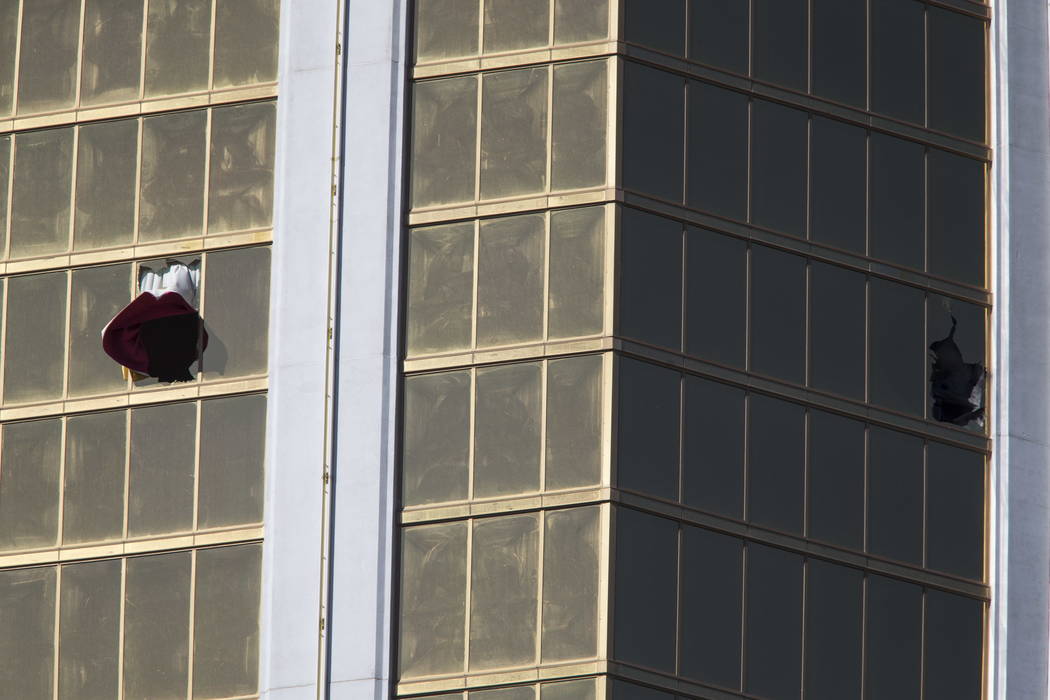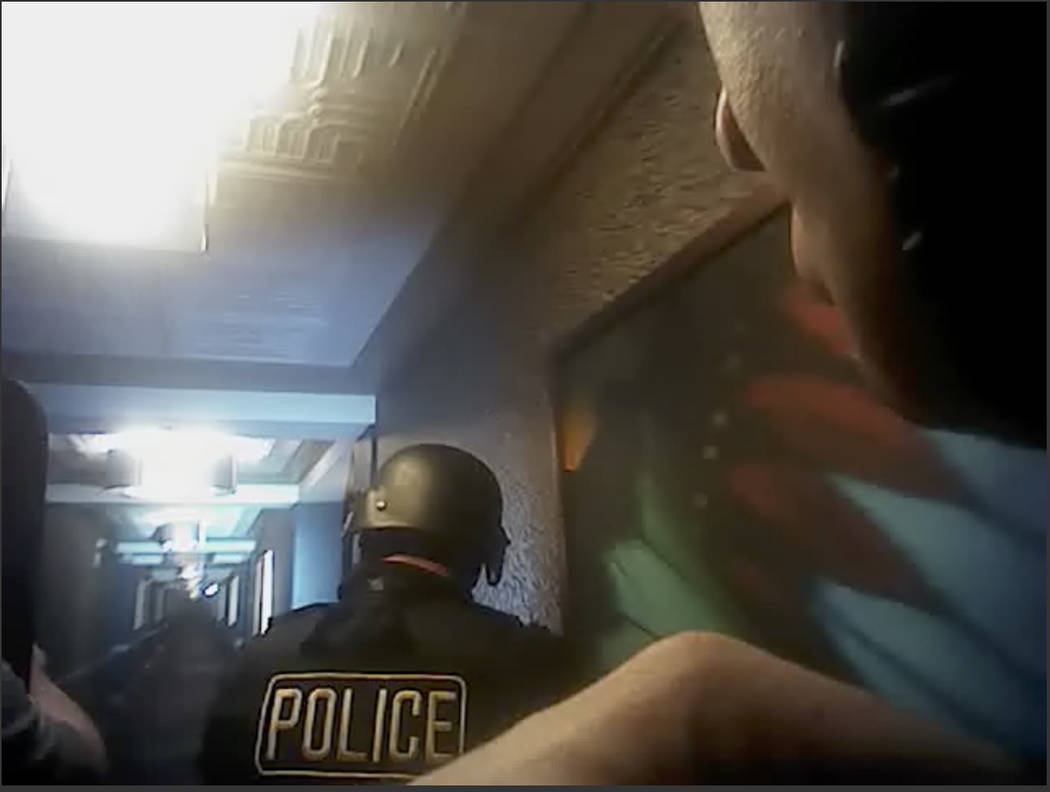Video shows officers waiting in hallway during Las Vegas shooting



Newly released body camera footage shows two Las Vegas police officers holding their position in a hallway one floor beneath the Oct. 1 gunman for nearly five minutes as rounds are continually fired into the Route 91 Harvest festival crowd below.
Officer Cordell Hendrex utters an expletive on the video while on the 31st floor, reacting to the sound of rapid gunfire, which he later described in a report as being “like thunder all around and above us.”
Four and a half minutes would pass between the moment Hendrex and his first-day trainee, Elif Varsin, stepped out from an elevator into the hallway in the middle of the mass shooting and what would be the final volley of gunfire.
In that time, at least one of the three armed Mandalay Bay security guards with the officers reported the shooter’s location: “the 32nd floor, room 135.” Still the pair held their position.
Journey to 31st floor
The footage was part of the eighth batch of records released since a Nevada Supreme Court decision in April compelled the Metropolitan Police Department to begin handing over the records, which the Las Vegas Review-Journal and other media organizations sued for in the days after Oct. 1.
“Every officer’s actions that night are being evaluated,” Metro spokeswoman Carla Alston said in a statement Wednesday. “One of the things Sheriff (Joe) Lombardo has said from the beginning is that this is an ongoing investigation. Part of that investigation is the evaluation of the performance, actions and conduct of every officer and civilian employee involved in the incident.”
The video in question, which lasted about 10 minutes, came from Varsin’s body camera on the night of the shooting. It begins in the Mandalay Bay security office as the officers cite two women for trespassing, according to Hendrex’s previously released report.
The first 30 seconds of footage contain no audio, but about 22 seconds in, the officers can be seen walking out of the security office and onto the casino floor, accompanied by the three armed guards. A few seconds later, the audio cuts in, and the words “active shooter” can be heard in the background.
For about two minutes, the group walks past slot machines and casino patrons as police radio transmissions describe what is unfolding at the festival grounds. It is not until another officer broadcasts over police radio that shots are coming from Mandalay Bay that the group begins running and makes it to an elevator, hopping in front of hotel guests waiting with their luggage.
Inside the elevator, the group discusses the 32nd floor — where the shooter is located — and the 31st floor. For unknown reasons, Hendrex and Varsin get out on the 31st floor with the armed guards, pistols drawn.
The next nearly five minutes take place in a hallway on the 31st floor, directly beneath the gunman.
‘I hesitated’
Nearly two minutes after the group arrives on the 31st floor, Hendrex announces his position over police radio.
“I’m inside the Mandalay Bay on the 31st floor,” he says. “I can hear the automatic fire coming from one floor ahead, one floor above us.”
About 20 seconds later, the group hears a transmission from an officer on the ground: “Multiple GSWs (gunshot wounds) to the chest, leg, femoral arteries in the medical tent.”
As the transmission ends, Hendrex suddenly takes several steps backward, then dips behind an alcove next to a hotel room door. His trainee and the guards do the same.
“I know I hesitated and I remember being terrified with fear and I think that I froze right there in the middle of the hall for how long I can’t say,” Hendrex would later write in his report.
Shortly after the group takes cover, one of the guards gets on Mandalay Bay security radio and says, “We know where it’s at, the 32nd floor, room 135. Everyone else off the radio. I’m with Metro now.”
For another minute and a half, the group stands still.
“We’re taking gunfire,” an officer on the ground can be heard saying in the meantime over police radio. “It’s going right over our heads. We’re pinned down here with a bunch of civilians.”
Hendrex “once again hesitated” and “did not know what to do next,” according to his report.
As the final volley of gunfire goes off, Hendrex exclaims, “Oh, my God!”
“We can’t worry about victims,” a different officer can be heard broadcasting over police radio a few seconds later. “We need to stop the shooter before we have more victims. Does anyone have eyes on the shooter?”
Hendrex does not respond but begins walking down the hallway alone.
“Where are you going, sir?” his trainee asks.
Without an audible answer, she begins following Hendrex and the armed guards toward the stairwell.
Eliminate the threat
Michael Quinn, an expert in law enforcement tactical training and use of force, said it’s hard to judge the officers’ actions because “it’s such a terrible incident.”
“But my gut feeling is experienced officers would have moved on that room as quickly as they knew where it was,” he said. “They would have come up with a plan.”
Public salary records show Hendrex has worked for Metro since at least 2009.
“In a case like this, I think it’s our responsibility to get in there as fast as possible. Would that have saved lives? Probably, if it went well,” Quinn said. “Would it have cost them their lives? Yes, absolutely. That’s part of the job.”
He noted that the two police officers had the assistance of armed security guards, but he also acknowledged the “fear factor.”
“Uniform or not, not everyone is capable of doing that,” Quinn said, adding that even officers in training situations sometimes hesitate. “It’s not because of a lack of heart. It’s not because of a lack of wanting to. It’s because they are human beings.”
Quinn also noted that Varsin was a trainee, which may have affected Hendrex’s response.
“The field training officer always feels a strong sense to protect the recruit,” Quinn said.
In another video, sometime after the gunman’s hotel suite was breached and long after the mass shooting ended — leaving 58 concertgoers dead and hundreds more injured — Varsin can be heard saying it was her first day in the field.
“How was your day?” another officer replies.
“Crazy,” she replies.
Question of liability
Louis Schneider, a Las Vegas criminal defense attorney and civil rights lawyer, said newly established law enforcement policies across the country encourage officers to take out active shooters. But he added that Nevada law protects Metro officers from being held liable, unless their inaction is intentional.
“In the limited context of this video, it looks like they’re moving deliberately slow, but that could be for safety purposes,” Schneider said. “But if you wait on an active shooter, you end up using a lot of body bags.”
Mandalay Bay security guards also have a responsibility to address gunfire, Schneider said. If the casino’s security policy requires guards to wait for Metro, it could be outdated.
“That doesn’t relieve them of the liability of not taking action to save lives,” he said. “Why do those security guards have their own guns? What are they, just for show?”
A spokesman for MGM Resorts International, which owns Mandalay Bay, declined to comment Wednesday.
Jesus Campos, a Mandalay Bay security guard, was shot in the leg on the 32nd floor while responding to an unrelated call as the mass shooting began.
A total of 19 body camera videos and 35 audio clips were released Wednesday. Last week Las Vegas police released 23 body camera videos and more than 100 audio files from the night of the tragedy.
Las Vegas police are expected to release more records Tuesday.
Contact Rachel Crosby at rcrosby@reviewjournal.com or 702-387-5290. Follow @rachelacrosby on Twitter. Review-Journal staff writers David Ferrara and Katelyn Newberg contributed to this report.
Related
Video captures shooting of Las Vegas police officer on Oct. 1













